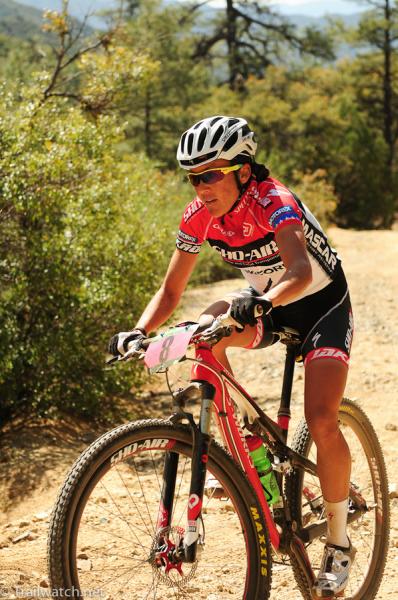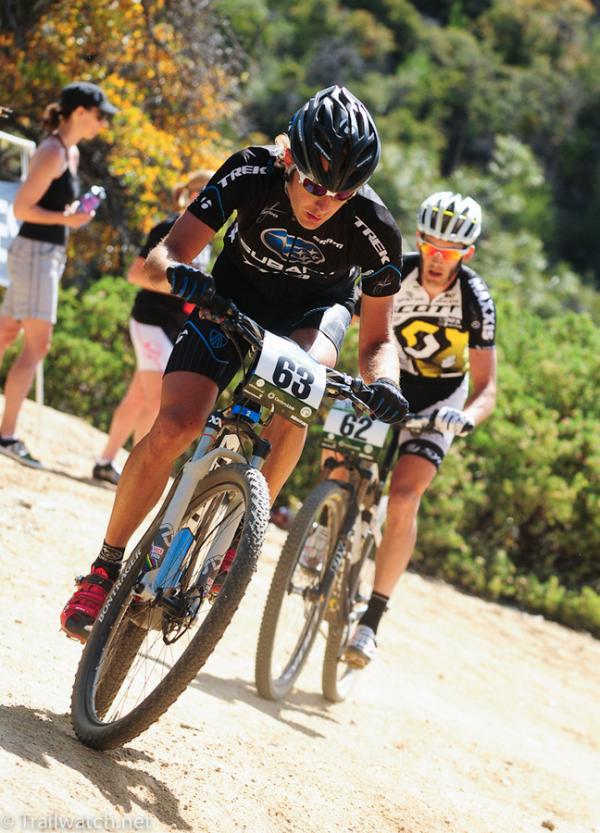Team managers and non-sanctioned race promoters frustrated by UCI rules
Insurance coverage not an issue for non-USAC events


The enforcement of UCI rule 1.2.019 and the related 1.2.020 and 1.2.021, which forbid UCI-licensed riders in all cycling disciplines from competing in non-sanctioned races and specify punishment for doing so, has drawn criticism from many mountain bikers. But it's not just mountain bikers who are affected; promoters of non-sanctioned races and managers of teams which include racers who normally participate in unsanctioned races face consequences.
One affected race series is the National Ultra Endurance (NUE) series of mostly 100-mile mountain bike races across the US. The series typically draws some top riders who also compete in international events. Some past and current top NUE racers, involved in either individual events or the overall series, have included Amanda Carey, Jeff Schalk, Cheryl Sornson, Chris Eatough, Jeremiah Bishop and Sue Haywood to name a few. Some well-known events in the series include the Cohutta 100, the Mohican 100, the Park City Point 2 Point and the Shenandoah Mountain 100. None of the NUE Series races are USAC-sanctioned.
Should the rules end up being enforced this year as the UCI has stipulated, mountain bike pros will have to chose between racing unsanctioned events like those of the NUE Series and facing consequences or sticking with "safe" sanctioned races.
"This is America where racers are free to choose where to pedal their bikes and clearly, American racers have seen through USA Cycling's attempt to use this UCI rule to coerce racers and race organizations to join or else," NUE Series Director Ryan O'Dell told Cyclingnews.
USA Cycling had told Cyclingnews earlier this week that it was enforcing the UCI rules for UCI license holders at the request of the UCI, which had requested such enforcement of all national federations.
"Anti-trust lawsuits are already under discussion and may be headed their way.To salvage their credibility, USAC must do the right thing and confront the UCI. It's time to represent America and reverse this ruling now, before it is too late. I predict that failure to reverse course may result in the demise of USAC."
Another viewpoint
The latest race content, interviews, features, reviews and expert buying guides, direct to your inbox!
Ty Kady sees the problems with the UCI non-sanctioned race participation rule enforcement from two different sides. He wears the hat of US Cup Marketing Director and recently helped promote two US Pro XCT events, both of which were sanctioned by USA Cycling and one of which offered UCI points. He is also the director for the Sho-Air/Cannondale mountain bike team.
Speaking as a promoter, Kady told Cyclingnews, "USA Cycling's argument that promoters sanctioning with them are somehow better insured and are part of the their 'Ground Breaking' Race Clean program has been false from our experience."
"At Bonelli [Park], which was a UCI XCO C2 inscripted event, on top of all the official prize money and park permit fees, there were inscription fees, etc. associated with hosting a UCI race. Which, by the way, USAC offers no subsidy at all for promoters raising their hand to host these events."
"We were charged $800 to be a part of the Race Clean program. As a promoter, we welcomed the concept and were willing to play our part. However, no doping control was performed at Bonelli, so again, where did our funds go? We weren't reimbursed our money back for something that never took place. Also Fontana, round #3 of their Pro XCT series, had no doping control either, so USAC's new vigilance against doping after the [Lance] Armstrong era seems to have little merit from our personal experience."
Kady addressed the insurance issue as all promoters of sanctioned and non-sanctioned races must do.
USA Cycling had told Cyclingnews, "When compared to similar products, our insurance is second to none and priced below today's market."
Kady said he has "begun looking into event insurance as there are only a few brokers in the US that you can go to. From our research, as well as talking to other non-USAC promoters, comparable event insurance is cheaper when you cut USAC out of the picture."
Dan McKay of McKay Insurance Agency backed this up and refuted USA Cycling's claims about insurance published yesterday on Cyclingnews.
"What USAC is claiming is disingenuous," he said. "I was a little disappointed in USAC in their cavalier attitude about insurance and in saying that promoters doing non-sanctioned events with other insurance was not as good. I don't know how they are getting off saying that they have superior coverage."
"Instead of postulating on that, they should get someone who is an actual licensed insurance agent to review their coverage. Their coverage is so far inferior to what's out there on the open market."
McKay gave an example of an athlete without his or her own health insurance who crashes in a race and gets injured, with a medical bill of $25,000.
"If an athlete were injured in USAC-sanctioned event and did not have his own insurance, the athlete would be responsible for first $5,000, which is their deductible, and remaining 30% of balance. A $25,000 medical bill would cost the athlete $11,000."
McKay, who writes insurance coverage for many non-USAC sanctioned MTB races and events, including the National Interscholastic Cycling Association (NICA), said of his company's coverage. "An athlete who is insured through one of our events would be responsible for $100 (deductible) and that's all for that same $25K bill."
He noted that for a series event, insurance costs $3 per rider for a USAC sanctioned event and $3.25 per rider for a non-USAC sanctioned event. "Those numbers don't tell the whole story of what's covered," he said, "and it doesn't consider all the costs of putting on a USAC-sanctioned event."
Due to issues like insurance, Kady said, "The US Cup is seriously considering going non-USAC next year and pumping out bigger events and better prize money for pros who attend. The select '0.5%' of racers that have World Cup or Olympic aspirations can focus on Europe and other races that may offer sanctioning. But we won't penalize 99.5% of the pro mountain bikers out there who quite frankly aren't going to World Cups or the Olympics."
"And honestly our bread and butter is providing great racing for the amateurs who will attend a race regardless of what pros toe the line. Because at the end of the day, mountain biking is a personal experience and not driven purely as a spectator sport like USAC and UCI seem to think."
The team manager's perspective
Kady's Sho-Air/Cannondale team has already taken a stand against the rules by announcing that it will compete in the unsanctioned Whiskey 50 at the end of April.
The team had previously withdrawn its UCI team registration, based on a prior interpretation from USA Cycling that the rules would only apply to riders on registered UCI teams. That interpretation was subsequently amended to include all UCI licensed riders per a March 26th letter by USA Cycling.
"For us as a team and for our sponsors, this ruling is a big disappointment. We purposely removed ourselves from the UCI registered trade team list so our riders like Jeremiah Bishop, Monique Mata and Alex Grant could race and support quality non sanctioned events that fit into their racing calendar and our team goals. There are several non-sanctioned events that quite honestly offer better prize money and media exposure than current USAC or UCI sanctioned events. For us and our sponsors, there is value in attending those races and clearly we can make the distinction if a non-sanctioned event is safe and legit or not."
"I also take issue with USAC's following statement: 'Professionally-licensed riders are the direct beneficiaries of USA Cycling's significant investment in athlete support. As such, they have a vested interest to support the sanctioned events that fuel that support.'"
Kady told Cyclingnews that when a UCI XCO C2 event like his own Bonelli Pro XCT only pays the men's winner $392 and 10th through 15th only pays $40, there's something wrong with that picture.
"You start telling pros when and where they can and cannot race. Yet a race like the Whiskey 50 is paying out $40,000 in equal prize money and gets over 1,500 amateurs and is on the 'banned' list because the promoter chooses not to sanction with USAC. I don't see their logic in that. Clearly they don't have a competitive product for this and other non -sanctioning promoters, yet we as a community can say that this event in first class in every way - prize money, safety, level playing field and media."
On the subject of prize money for the elite national series events, Kady said, "I would also ask USA Cycling's CEO to answer why doesn't their Pro XCT and Pro UET series offer overall prize money, since these series are claimed to be their most 'prestigious' National Calendar series events for MTB racers? They have never paid out one dime, so tell me how they are validating their own series and the racers who chase the entire series, with no monetary reward at the end?"
Kady noted that his team paid for Monique Pua Mata to attend the marathon Worlds in Italy two years ago. They also paid for her USA Cycling team kit. "After she placed eighth and was best North American, there wasn't any type of reimbursement, or even a simple 'Well done' from them. So again, I would like to know where all their money and support is going to? We certainly haven't experienced it with our riders."
A possible solution?
Late on Tuesday, USA Cycling posted to its Facebook page, "USA Cycling, along with the UCI, is working on solutions to questions and issues raised surrounding the enforcement of UCI rule 1.2.019. We hope to have an initial solution agreeable to all within the next day or two."
No details have yet been released.
Sue George is an editor at Cyclingnews. She coordinates all of the site's mountain bike race coverage and assists with the road, 'cross and track coverage.